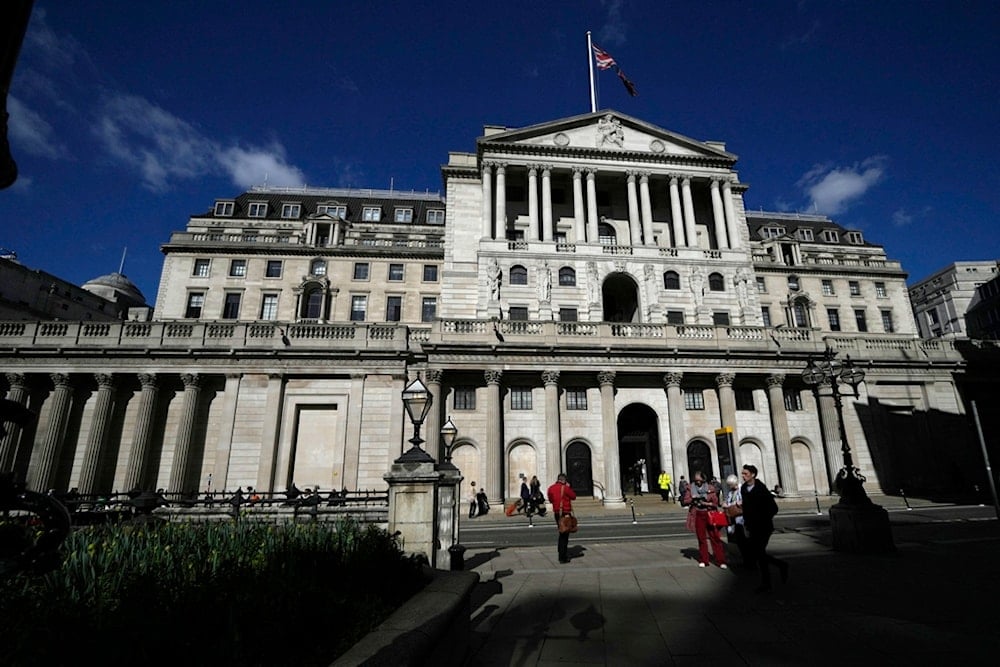Bank of England warns Trump tariffs could spark corporate defaults
The Bank of England warns that Trump’s escalating tariff war, compounded by geopolitical instability, could expose hidden vulnerabilities in the UK manufacturing and retail sectors, threatening corporate defaults, job losses, and broader financial instability.
-

A general view of the Bank of England in the City of London on March 17, 2022. (AP Photo/Alastair Grant, File)
The Bank of England issued a stark warning on Wednesday about the potential economic fallout from Donald Trump's escalating trade war, cautioning that a surge in tariffs could trigger a wave of corporate failures and financial losses for global banks.
In its latest financial stability report, the Bank's financial policy committee raised alarms over the compounding effect of higher trade levies on already-strained sectors. The committee noted that recent developments, namely, Trump's shifting border tax policies and instability in the Middle East, have heightened risks to both global growth and inflation.
Tariffs threaten stability
The warning comes after the UK's GDP fell by 0.3% in April, while inflation, although moderating from its 2022 peak, remains sticky at around 3.5%. With unemployment edging up to 4.6% and wage growth slowing, analysts say the economy may be entering a fragile phase. Consumer-facing sectors, already hit by high costs and weak demand, are among those most at risk.
"The potential for much higher trade tariffs increases the likelihood of corporate default in the most exposed sectors, and losses for their lenders," the report stated, highlighting the vulnerability of firms carrying substantial debt.
While the Bank assessed that most UK companies remain stable due to manageable net debt levels, it stressed that broad resilience may conceal risks concentrated within specific industries.
"Notwithstanding the trade deal between the UK and US, if the shock were to worsen, with greater than expected tariffs globally and larger than expected spillovers to world demand, it could impact UK corporates," the committee warned.
Read more: UK living standards squeezed despite leading G7 growth
Particularly at risk are manufacturers and retailers, two sectors already hit by persistent cost pressures, weakened global demand, and supply chain instability. Retailers, in particular, may struggle to pass on rising costs to consumers still grappling with elevated prices for food, energy, and essentials.
The report underscored that such businesses may struggle to compensate for revenue shortfalls by increasing prices. Adding to their vulnerability, recent cyberattacks, such as the one that cost Marks & Spencer nearly £300 million in lost profits, have further strained corporate balance sheets.
Hidden sector vulnerabilities
The Bank also noted that firms in manufacturing and retail are more exposed to the negative impacts of trade tensions, especially in a context where borrowing could become more difficult.
"The overall picture could ‘mask vulnerabilities within particular firms and sectors,'" the committee observed.
A survey cited by the Bank estimated that roughly 60% of UK employment is tied to companies susceptible to a global trade disruption, adding that these same businesses hold approximately 30% of all outstanding corporate debt in the UK.
"Increased global fragmentation means that debt issuance could become more challenging for UK corporates in high yield and leveraged lending markets, which are largely reliant on international investors," the report added.
With the global trade environment becoming increasingly uncertain, the Bank's analysis paints a cautious picture of the UK's financial outlook. While most firms may appear stable on paper, mounting external pressures, from tariffs to geopolitical risks, could expose hidden weaknesses and derail the country's already shaky recovery.
Read more: UK economy shrinks unexpectedly, F&B exports down by 34%

 3 Min Read
3 Min Read









